
If you’ve ever stopped using cannabis after a long stretch and suddenly found yourself in a movie-length dream marathon every night — you’re not imagining things. Cannabis and dreams have a very real relationship, and it all comes down to how weed plays with your sleep cycles.
In this post, we’re going to explore how cannabis can affect your dreams, why you might stop dreaming while using it, and what happens when you hit a tolerance break or quit cold turkey. So, grab your stash (or don’t), get comfy, and let’s dive into what it really means to dream high.
Dreams mostly happen during REM sleep (that’s short for rapid eye movement), which is a lighter sleep phase that typically occurs in 90-minute cycles. This is when your brain goes wild with vivid, cinematic dreamscapes and it’s crucial for emotional and memory processing.
Now here’s the kicker: cannabis can suppress REM sleep. One of weed’s lesser-known superpowers is its ability to reduce the amount of time you spend in REM. According to studies, THC (the main psychoactive compound in cannabis) can shorten REM sleep and increase deep sleep instead.
Translation? You dream less when you’re regularly using cannabis.
Because you’re literally dreaming less. When cannabis suppresses REM sleep, your brain doesn’t enter that dream-heavy state as often or as intensely. This makes dream recall harder and dreams less vivid.
Many people who use cannabis nightly report not remembering their dreams at all — and that’s totally normal. You’re still sleeping, but the “nightly Netflix in your brain” is turned way down.
Now here’s where things get trippy.
If you’ve ever taken a tolerance break or quit using cannabis altogether, you might experience a “REM rebound.” This means your body tries to make up for lost REM time by flooding you with intense, often super vivid dreams—sometimes for days or even weeks.
This isn’t a bad thing. It’s just your brain recalibrating. REM sleep is essential for cognitive and emotional health, so this bounce-back is a sign that your brain is doing what it needs to do.
Short answer: not typically.
Cannabis isn’t known to enhance dream recall or intensity — in fact, most studies suggest the opposite. But some anecdotal reports (and Reddit threads galore) say that low doses of certain cannabinoids like CBN (cannabinol) or strains high in terpenes like myrcene may help promote deeper sleep without fully suppressing dreams.
Want to try to dream high? Try:
Just know that science is still catching up on exactly how different cannabinoids affect sleep architecture. So, take any “dream booster” claims with a grain of kief.
Alright, here’s what we know. Cannabis can be an amazing tool for relaxation, pain relief, and deeper sleep — but when it comes to dreams, it’s more likely to mute them than enhance them. So no, you probably aren’t going to dream high.
If you’re looking to remember your dreams more clearly, taking a short break from cannabis (commonly called a tolerance break) use might be just what your brain needs to hit that REM reset button.
Whether you’re blazing every night or taking a mindful break, it’s all part of learning how your body and brain respond to cannabis. And hey, sweet dreams either way.

Astrology gives us a glimpse into our personalities, moods, and preferences, so why shouldn’t we use it to guide our cannabis choices, too? If you’re into astrology and cannabis (as all the best people are), here comes the cosmic crossover you didn’t know you needed.
Terpenes, the flavorful, aromatic compounds in cannabis (and other plants, for that matter) influence how you feel — chill, focused, uplifted, sleepy, etc. — and the real tea? Some terpenes match your zodiac sign’s energy perfectly. Whether you’re a sensitive Pisces or an overachieving Capricorn, there’s a terpene with your name on it.
Aries Vibe Check: High-energy, go-getter, 100% chaotic good. You live for adventure and have a low tolerance for slow vibes.
Why Limonene: Bright, citrusy, and mood-lifting — limonene brings energy and motivation without overstimulating your fire sign brain.
Best for: Pre-hike pep, hyping yourself up for a first date, or tackling your inbox with rage and positivity.
Taurus Vibe Check: Chill, loyal, comfort-motivated, luxury-loving homebody. You’re probably reading this from under a weighted blanket.
Why Myrcene: It’s super relaxing — like, melt-into-the-couch relaxing — and famous for its sleepy, full-body effects.
Best for: Self-care nights, Netflix marathons, and post-brunch naps that accidentally last all afternoon.
Gemini Vibe Check: Talkative, curious, always thinking 10 steps ahead (sometimes out loud).
Why Pinene: This terpene promotes mental alertness and memory — perfect for keeping up with your own ideas mid-convo.
Best for: Late-night convos that turn into philosophical debates, learning something random on Reddit, or staying sharp at family game night.
Cancer Vibe Check: Soft, sentimental, moody (in a poetic way). Feels things deeply and watches old movies for comfort. You’re all about emotional safety and protecting your energy.
Why Linalool: A calming, anti-anxiety terpene that helps regulate emotion and promotes relaxation. It’s plant-based emotional support and perfect for helping you turn down the volume on your feels.
Best for: Crying in the bath (in a healing way), grounding yourself during emotional swells, or de-stressing after a people-heavy day.
Leo Vibe Check: Charismatic, passionate, confident. You’re the main character and you know it, but you’re a big softie with an even bigger heart.
Why Caryophyllene: This anti-inflammatory terp also has mood-regulating qualities, balancing your inner fire while keeping you radiant.
Best for: Performing (on stage or in life), high-energy days when you need to stay grounded, or reflecting without losing your shine.
Virgo Vibe Check: Analytical, productive, low-key perfectionist with a hyper-organized Notes app.
Why Pinene: Sharpens focus and supports memory — great for getting things done without spiraling into overthinking.
Best for: Deep cleaning your entire apartment “just because,” organizing, or making a multi-step wellness routine.
Libra Vibe Check: Lives for an aesthetic, charming peacemaker with a curated vibe for literally everything.
Why Limonene: Uplifting and bright — just like you. It supports mood balance and helps keep your social battery charged.
Best for: Hosting a picturesque picnic, planning the perfect night in, or flirting without trying too hard (as per usual).
Scorpio Vibe Check: Intense, mysterious, emotionally complex (if you’re lucky enough to see that side of them).
Why Linalool: Soothing, anxiety-reducing, and perfect for quiet, deep introspection — which is your love language.
Best for: Tarot card nights, processing big emotions, or turning off the world to reconnect with your inner depths.
Sagittarius Vibe Check: Bold, funny, unpredictable, always booking the next spontaneous trip.
Why Caryophyllene: This terp keeps you chill and physically relaxed while letting your wild spirit roam free.
Best for: Post-adventure muscle relief, laughing too hard at your own jokes, or balancing wanderlust with some grounding energy.
Capricorn Vibe Check: Driven, structured, strong silent type — but soft when you let your guard down.
Why Myrcene: Deeply relaxing and body-soothing, it helps you unwind after overachieving all day (again).
Best for: Post-work decompression, staying mellow during power moves, or reminding yourself to breathe.
Aquarius Vibe Check: Quirky, inventive, unpredictable genius energy. You’re a walking think piece.
Why Terpinolene: Creative and cerebral, this terpene stimulates the mind and encourages fresh ideas.
Best for: Brainstorming a side hustle at 1am, vibing out to weird playlists, or reinventing your entire identity midweek (again).
Pisces Vibe Check: Dreamy, emotional, artistic, and lowkey psychic. Lives half in the real world, half in a Studio Ghibli film.
Why Linalool: This gentle, floral terp supports emotional ease and creativity — ideal for your soft, intuitive soul.
Best for: Painting through your tears (in a cute way), writing poetry in your Notes app, or napping in the sun.
Whether you’re chasing energy, clarity, or full-on chill, there’s a terpene that fits your zodiac vibe like it was literally made for you. Check out our helpful terpene benefit guide for more information about some of your favorite terpenes.
Want to try your sign’s terpene IRL? Head to your local dispensary to hunt for strains and products that make your cosmic self-care even more you. But don’t forget that in Utah, a Medical Cannabis Card is required to enter a dispensary and purchase any product with more than 0.3% THC in it. Let our team help you get a Medical Marijuana Card today.
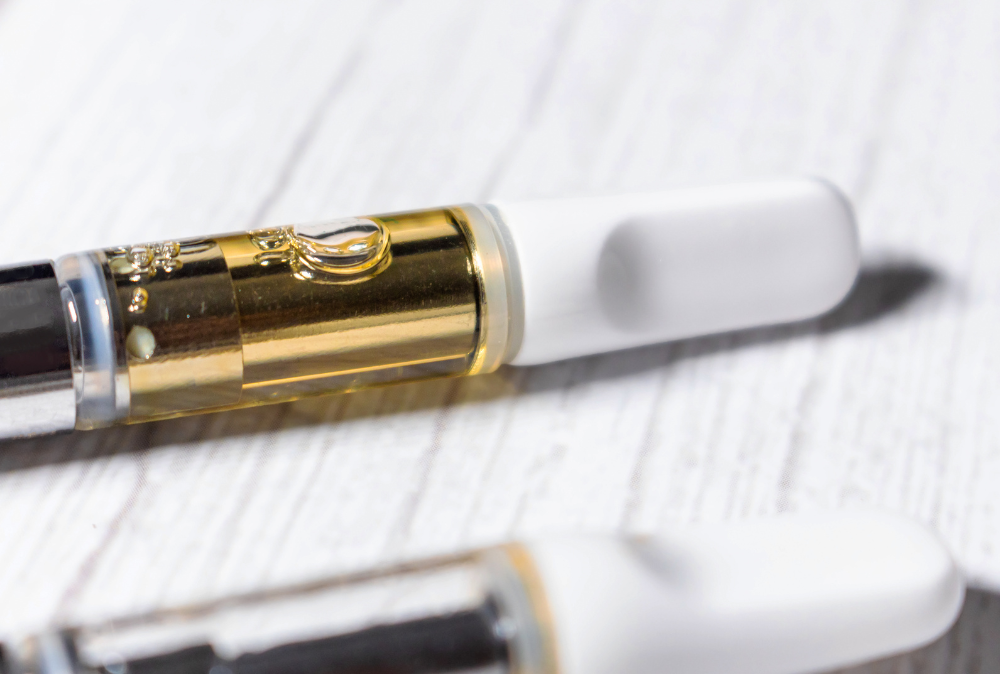
So, you just popped a new vape cartridge onto your battery, all excited to take a hit … and nothing. Nada. Zilch. No vapor, no buzz, no relief — just disappointment. Before you toss it out, take a breath. Broken carts (or ones that seem broken) are a super common issue, and most of the time, they’re totally fixable.
Here’s your simple, no-BS guide on how to fix a broken vape cartridge — even if you’re not exactly a tech wizard.
Let’s start with some simple detective work. A “broken” vape cartridge might actually just be a dead or finicky battery.
Pro tip: If your battery has adjustable voltage, start low and bump up the temp slowly. Too much heat can wreck your oil.
Problem: It’s Clogged
A clogged cart is the most likely issue, especially if it’s been sitting around or the oil is thicker.
Problem: Connection Drama
Sometimes your cart and battery just aren’t vibing.
In some cases, if the vape cartridge was purchased at a pharmacy or dispensary, the facility would have a policy in place for defective products. For example, local Utah medical dispensary, WholesomeCo Cannabis, has a return policy that makes it simple. You can log in to your account and report your defective product online in a matter of minutes. Once the team reviews and verifies your report, you’ll be refunded the cost of the cart to your account in the form of a credit.
If the cart is truly toast (cracked, leaking, or otherwise donezo), don’t cry over spilled THC. You can still rescue the oil.
Most vape cartridge issues are totally fixable and learning how to fix a broken vape cart just takes a little patience (and maybe a paperclip). Before giving up, try the quick fixes above — you might save yourself the cost of a new cart and a trip back to the dispensary.
Got a cart that still won’t hit after all this? Check out this WikiHow guide for more in-depth troubleshooting tips.
May your clouds be fat and your carts forever hitting smooth. Happy vaping!
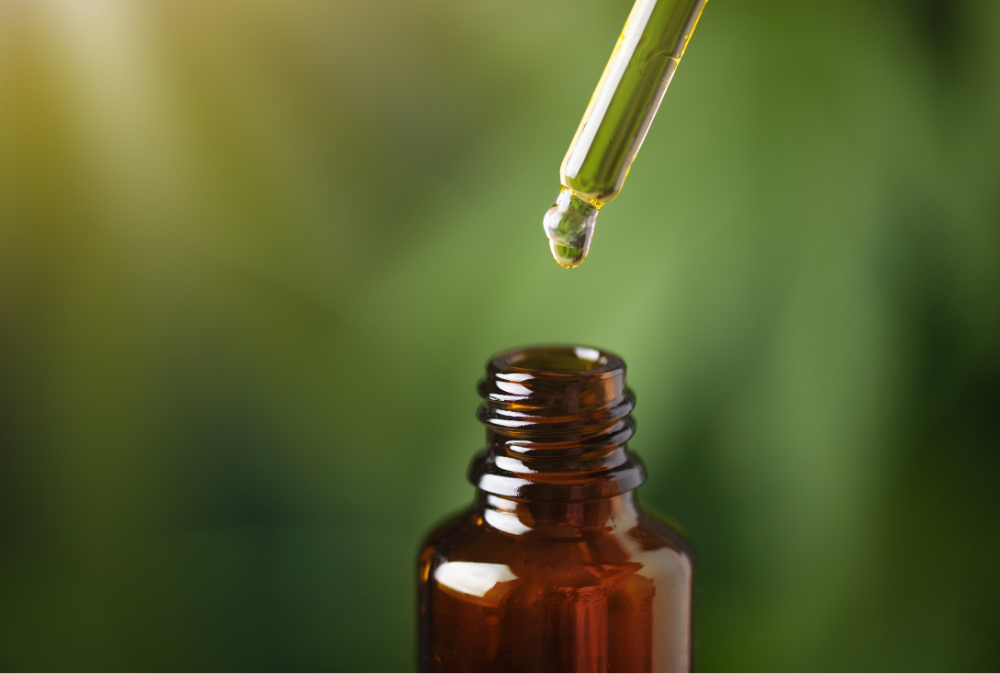
So, you’re curious about cannabis, but the idea of getting too high gives you pause? Maybe you’re a patient looking for the medical benefits of cannabis, but not the high, or a seasoned toker looking for a smoother, more productive buzz. Welcome to the wonderfully balanced world of microdosing cannabis — the Goldilocks zone of getting high: not too much, not too little, but juuust right.
Microdosing cannabis is the practice of consuming very small amounts of THC (usually between 1 to 5 milligrams) to enjoy the plant’s benefits without experiencing the full psychoactive effects. Think of it like sipping a cocktail instead of downing a shot — it’s all about subtlety.
While microdosing is common in the world of psychedelics, it’s gaining major traction in the recreational and Medical Cannabis communities because it can enhance mood, creativity, and focus, as well as address conditions like pain, nausea, and anxiety — all while keeping you totally functional.
Microdosing isn’t just for newbies or medicinal users — it’s for anyone who wants to enjoy the benefits of weed without going full stoner mode. Whether you’re a creative looking for inspiration, a parent juggling a million things, or someone managing chronic pain, microdosing cannabis could be your hero, baby, as Enrique Iglesias might say.
Cannabis isn’t one-size-fits-all, and that’s kind of the beauty of it. Microdosing cannabis lets you explore its therapeutic potential without the intensity. It’s a gentle, intentional way to bring a little extra good energy or relief into your day — minus the fog.
Ready to give it a try? Let’s chat! Schedule with us today to get a Utah Medical Cannabis Card. Or, if you’re still not sure, poke around our website for helpful tips, guides, articles, and answers to all your questions about cannabis. If we don’t have an answer for you online, our helpful team is always happy to help. Give us a call.
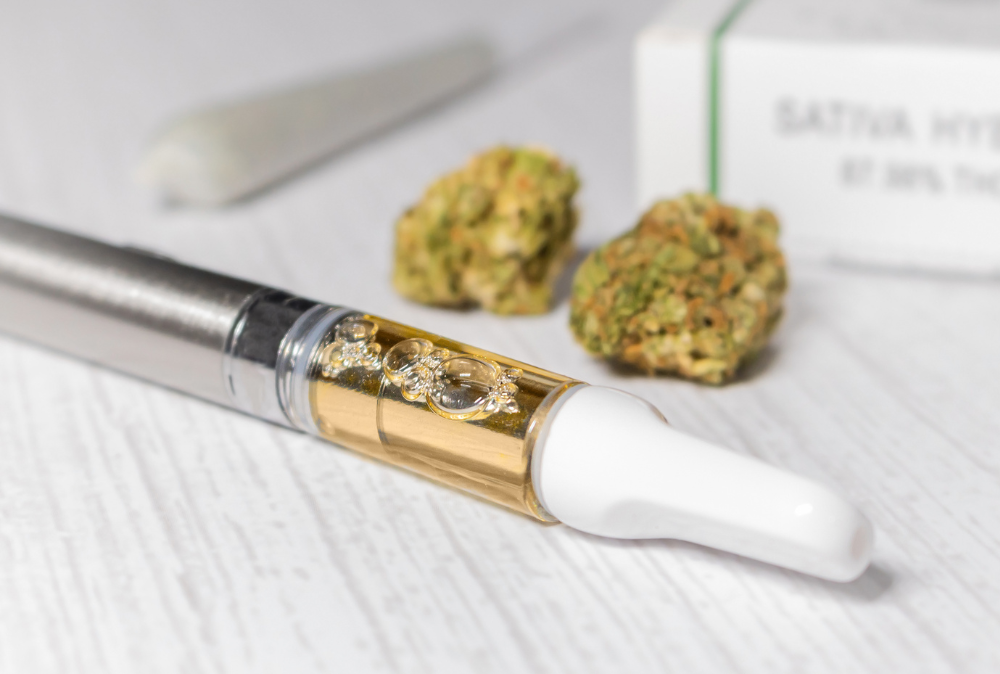
Cannabis has become a hot topic lately, whether you’re hearing about it as a relaxing way to unwind or as a legit option for treating various health conditions. As more places legalize cannabis for both medical and recreational use (sometimes called adult use), it’s important to understand the difference between the two — and why it matters when you’re deciding what’s right for you.
At its core, the difference between recreational and Medical Cannabis comes down to why you’re using it. Are you lighting up for fun or using it to manage a health condition? While that’s the basic distinction, there are some key differences in how they’re made, sold, and even taxed.
Here’s a quick breakdown:
Understanding the difference between recreational and Medical Cannabis isn’t just about knowing the rules — it can actually make a big difference in your experience.
At the end of the day, cannabis is an incredibly versatile plant, but the way you use it depends on what you’re looking for. Medical Cannabis can be a game-changer for people dealing with serious (qualifying) health conditions, while recreational cannabis offers a great way to relax and have fun.
The most important thing is to educate yourself. Whether you’re seeking relief or just a good time, understanding the products, knowing your local laws, and choosing wisely can help ensure a positive experience. Cannabis works wonders for some — just make sure you know what works best for you before diving in! For canna-guidance or to get a Medical Cannabis Card in Utah, schedule an appointment today.
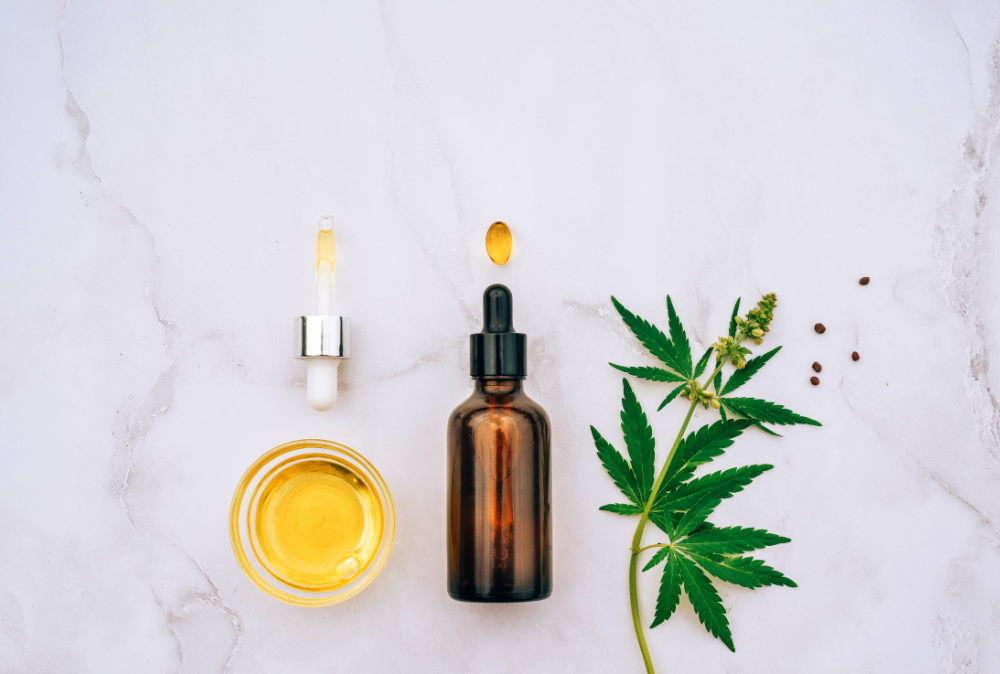
Cannabis is increasingly recognized for its potential therapeutic benefits, and many people turn to THC for anxiety relief. However, the relationship between THC and anxiety is complex, as the effects can vary based on dosage, strain, and individual tolerance. If you’re considering cannabis for anxiety management, it’s essential to understand how THC interacts with the body and what factors to keep in mind to make sure you have a positive experience.
Tetrahydrocannabinol (THC) is the primary psychoactive compound in cannabis. It interacts with the endocannabinoid system (ECS) by binding to CB1 receptors in the brain, influencing mood, stress response, and relaxation. A recent study suggests that low doses of THC can have anti-anxiety effects, while high doses may trigger or worsen anxiety due to overstimulation of these receptors.
1. Start with a Low Dose
Dosage is critical when treating anxiety with THC. Many users find that microdosing — taking very small amounts of THC (2.5–5 mg) — can provide relief without the unwanted side effects of paranoia or increased heart rate. Products like low-dose edibles, tinctures, or vaporizers allow for better control over intake.
2. Consider THC-to-CBD Ratio
CBD (cannabidiol), another key compound in cannabis, has been shown to counteract some of THC’s anxiety-inducing effects. Strains or products with a balanced CBD-to-THC ratio (like a 1:1 or higher CBD content) may be more effective for anxiety relief than high-THC options. CBD has anti-anxiety properties that may help regulate the effects of THC.
3. Choose the Right Strain
Cannabis strains can have vastly different effects. Indica-dominant strains tend to promote relaxation, while Sativa strains may be more stimulating and potentially worsen anxiety. Many users report success with hybrid strains that balance calming and uplifting effects. Popular choices for anxiety relief include:
4. Method of Consumption Matters
How you consume THC affects how quickly and intensely it impacts anxiety.
If you’re new to cannabis, or even new to using it for anxiety, starting with tinctures or low-dose edibles may be the best approach.
5. Set and Setting
Your environment plays a crucial role in how THC affects your anxiety. A calm, comfortable setting can enhance relaxation, while a stressful environment may heighten anxiety. Additionally, practicing mindfulness or deep breathing techniques alongside cannabis use can help maximize its benefits.
6. Monitor and Adjust as Needed
Everyone reacts differently to THC. Keeping a cannabis journal to track your dose, strain, method of consumption, and effects can help you determine what works best for your anxiety relief.
While many people find using THC for anxiety to help, others may experience negative effects, especially at higher doses. Potential risks include:
If you experience heightened anxiety, consider taking CBD or using grounding techniques like breathing exercises to help regulate your response.
THC can be a helpful tool to manage anxiety, but it’s not a one-size-fits-all solution. Starting with a low dose, balancing THC with CBD, and choosing the right strain and consumption method can all make or break your chances of a positive experience.
Before incorporating cannabis into your anxiety management routine, consult with a trained and educated Qualified Medical Provider. They can help you find a regimen that works for you, especially if you have a history of anxiety disorders or are taking medications that may interact with THC.
By approaching this treatment with mindfulness and caution, you can find the right balance to support your mental well-being. For more information or to see if you qualify for a Medical Cannabis Card in Utah, schedule an appointment with us today.
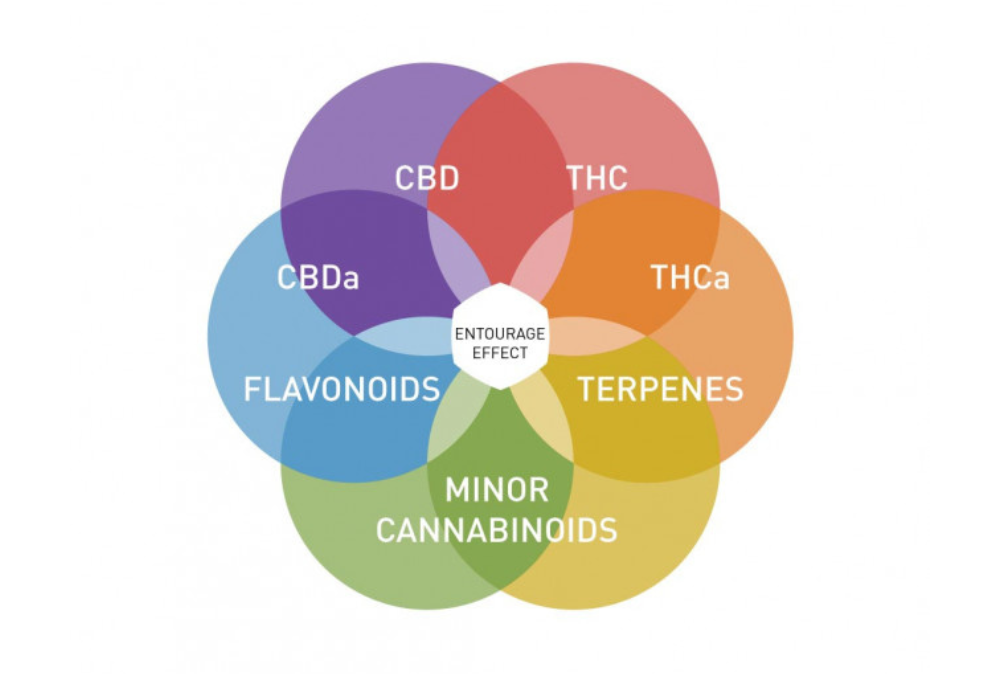
Cannabis is more than just THC and CBD. While these two cannabinoids are most widely recognized, the true therapeutic power of cannabis lies in how all of its components work together. We call this the entourage effect. Follow along as we dive into the entourage effect, how different compounds work together in whole plant medicine, and why it’s important for both medical and recreational cannabis users to understand.
The entourage effect is a term used to describe how the different compounds in cannabis — such as cannabinoids, terpenes, and flavonoids — work together to enhance or modify each other’s effects. Instead of relying solely on one isolated cannabinoid, the entourage effect highlights how the whole plant, with all its naturally occurring compounds, provides a broader range of therapeutic effects than isolated compounds alone.
Cannabis contains hundreds of cannabinoids, each with unique effects. The most common include:
Each cannabinoid affects the body’s endocannabinoid system (ECS) differently, but when used together, they can produce more therapeutic benefits. This synergy is the key principle behind the entourage effect.
In addition to cannabinoids, terpenes play a significant role in the entourage effect. Terpenes are the aromatic compounds found in cannabis (and other plants) responsible for the smell and flavor. In addition, they also have their own therapeutic properties and interact with other compounds to enhance their effects.
For example:
When combined with cannabinoids, terpenes can modify how cannabis affects the body, further demonstrating the importance of using whole-plant medicine.
Whole-plant medicine uses cannabis in its natural, unaltered form, incorporating all cannabinoids, terpenes, and other compounds. Unlike isolated cannabinoid products (such as pure THC or CBD oils), whole-plant cannabis offers a more comprehensive therapeutic effect.
The benefits of whole-plant cannabis include:
Cannabinoids interact with the body’s endocannabinoid system (ECS), which regulates various physiological processes like pain, mood, and immune response. The ECS has two main types of receptors: CB1 and CB2. CB1 receptors are mainly found in the brain and central nervous system, while CB2 receptors are located in the peripheral nervous system and immune cells.
When cannabinoids like THC and CBD are consumed, they interact with these receptors to produce various effects. THC binds especially well to CB1 receptors, which causes the characteristic “high” sensation. On the other hand, CBD interacts more indirectly with both CB1 and CB2 receptors, potentially moderating the effects of THC.
The entourage effect occurs when multiple cannabinoids and terpenes work together to influence the ECS. For example, CBD can reduce the psychoactive effects of THC, making it easier for users to tolerate higher doses without feeling overly intoxicated. This interaction leads to a more balanced experience, both therapeutically and in terms of side effects.
To experience the full benefits of the entourage effect, it’s important to choose whole-plant cannabis products that provide a broad spectrum of cannabinoids and terpenes. Here’s what to look for:
The entourage effect underscores the importance of using whole-plant cannabis for therapeutic purposes. By understanding how cannabinoids, terpenes, and other compounds work together, users can maximize the therapeutic benefits of cannabis. Whether you’re using cannabis for chronic pain, anxiety, or sleep issues, whole-plant cannabis offers a more balanced, holistic approach to wellness.
Embracing the entourage effect means tapping into the full potential of cannabis as a natural remedy. If you’re new to cannabis, start with full-spectrum products to experience the combined benefits of cannabinoids and terpenes. For more information on cannabinoids and the entourage effect, explore our website or schedule an appointment with one of our canna-expert QMPs.
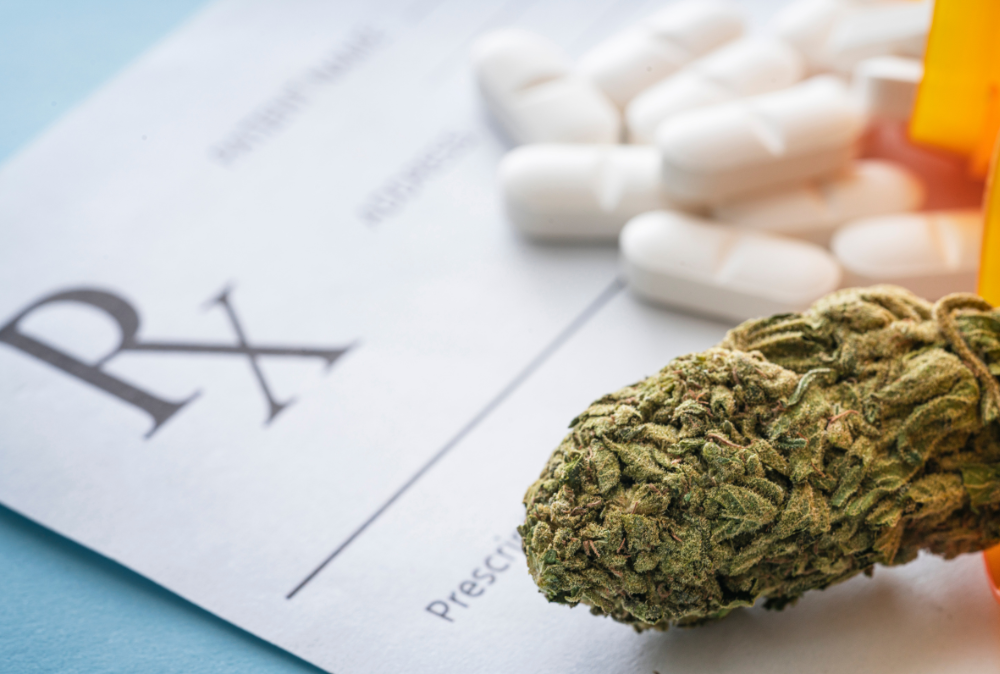
As more folks experiment with cannabis for mental health support, it’s crucial to understand how marijuana and antidepressants interact. While cannabis is known for its calming effects, combining it with depression medications may lead to unintended results. Follow along as we explore the potential interactions between cannabis and antidepressants to help patients make informed decisions.
Antidepressants work by balancing neurotransmitters, like serotonin and dopamine, in the brain. Marijuana, specifically cannabinoids like THC and CBD, can also affect these neurotransmitter systems. The combination of marijuana and antidepressants may interfere with how effective your medication is, increase side effects, or lead to unexpected health risks.
When it comes to your health, it’s best to avoid unnecessary risks. Before using cannabis with your antidepressants:
The interaction between cannabis and depression medication varies depending on the type of medication and the person’s individual response. While some combinations may have minimal effects, others post significant risks. Keep communication open with your healthcare providers to ensure safe and effective mental health treatment. To chat further about adding cannabis to your mental health regimen, schedule an appointment with the KindlyMD Care Team today. In one appointment, you’ll be preesented with the opportunity to discuss cannabis (and get a Medical Cannabis Card recommendation, if you qualify), your prescription medication, and meet with a Behavioral Health Clinician to monitor your overall mental health and wellbeing. Together, we’ll find the perfect combination to get you feeling better.

When cold and flu season strikes, many people turn to traditional remedies like tea, soup, and over-the-counter medications to feel better. But for those who regularly use cannabis to feel better, a common question arises: Should you be consuming or smoking weed while you’re sick? While cannabis offers potential benefits such as pain relief, improved sleep, and nausea reduction, it’s essential to understand how it interacts with your body during illness so you know what you’re in for.
If you want to use cannabis on your sick day but don’t want to smoke or vape, consider these methods to minimize irritation and maximize benefits:
While cannabis may offer symptom relief for colds and the flu, it’s important to be mindful of how you consume it so it doesn’t interfere with your healing journey. It’s best to avoid smoking or vaping if you have respiratory symptoms, and make sure to stay hydrated and listen to your body. If symptoms persist or worsen, consult a healthcare professional for guidance.
Have you tried using cannabis or smoking weed while you’re sick? How did it go? Share your experiences and thoughts in the comments below!